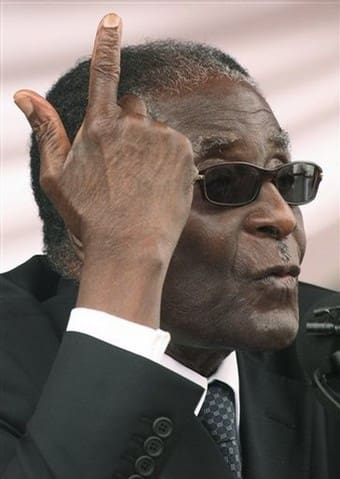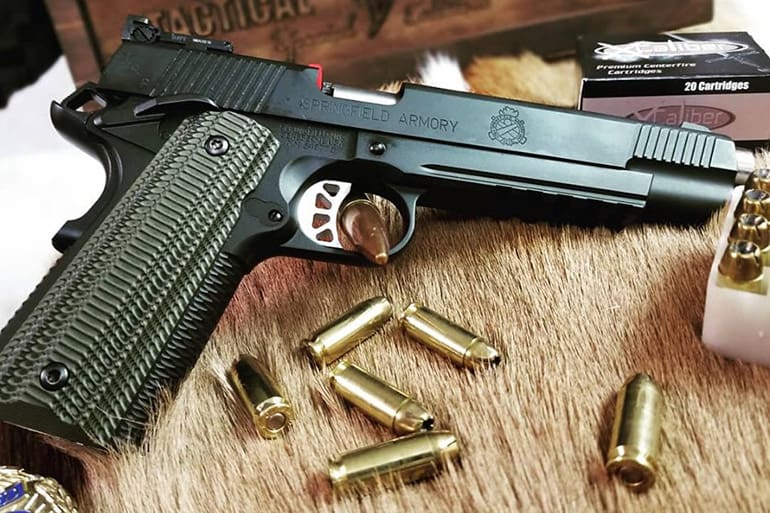Many American gun owners believe civilian gun ownership is the bulwark of democracy. They consider the right to keep and bear arms the safeguard against government-imposed tyranny. Those who oppose this idea reject that view in its entirety. Tyranny? What tyranny? Federally-mandated health care? You’re joking, right? In fact, gun control advocates consider civilians who use the “T” word as proto-anarchists. They’re the enemy within, dedicated to destroying the very thing they claim to protect (i.e. safety and security). The irony cuts both ways. Gun control advocates can’t see civilian gun ownership as anything other than a danger to society. They point to gun crime, spree killings, firearms-related suicides and firearms accidents as proof that their gun rights opponents are seriously deluded. In this profound rejection of an unrestricted right to bear arms, gun control advocates are willing to ignore history, and unwilling to look beyond America to see what happens when you disarm the citizenry. And that’s a shame.
Tyranny is the strong imposing its will upon the weak, without their consent. The best place to examine the effects of gun ownership on tyranny: at society’s fringes, where its weakest members live, work and die.
Did America ever have a more physically, politically and economically dispossessed group of people than the slaves that inhabited its borders? The tyranny imposed on American slaves was absolute. Suggesting that American slaves would have remained slaves if they had had access to effective firearms stretches the limits of plausibility beyond breaking point.
If slavery depends on disarmament, then it’s “cure” depends on force of arms. And so does its prevention.
Once liberated and armed by the Army of the North, black soldiers demonstrated their willingness to use firearms to protect their new-found liberties, and fight for those who remained under slavery’s yoke. They understood—just as supporters of their local police understand—that social equality must be established by force. And defended the same way. Unfortunately for America’s freed slaves, that’s not how things turned out . . .
The same people who call for gun control lionize the post-Civil War American Civil Rights movement. They believe that Dr. Martin Luther King’s non-violent “solution” to the problems of discrimination, segregation, injustice and racial violence shows that firearms should play no role in political debate.
But the question must be asked: would the Southern black community have suffered political disenfranchisement and murderous oppression, would they have endured these horrific, un-American indignities if they’d been allowed their Second Amendment right to keep and bear arms? Could the Ku Klux Klan have thrived if blacks had been able to defend their property and lives with guns?
Lest we forget, we’re talking about a hundred years of misery. A hundred years during which American blacks were denied the right to bear arms. While the Civil Rights Act of 1866 gave freed blacks the right to own guns, state and local governments did everything in its power to subvert that right. Inexpensive handguns were banned. Taxes were raised. Local authorities claimed the power to issue—or, in the case of African Americans, not—-gun licenses.
More irony (or karma, depending on your perspective): the race riots following Dr. King’s assassination helped led to to the passage of the 1968 Gun Control Act (based in part on Nazi gun control laws) which enabled even stronger restrictions against black gun ownership.
And yet the history of Slavery and the American Civil Rights movement is told without any mention of firearms whatsoever—save those used against the African American community. Stories of courageous blacks defending their rights with firearms (e.g. Jonesboro high school’s desegregation “riot”) are notable by their absence.
And gun control advocates still call for disarmament within African American communities—a policy whose abject failure is ascribed to the fact that it hasn’t gone far enough. An argument that completely ignores the beginnings of African American’s historical journey in this country, as unarmed, defenseless slaves.
Perhaps you noticed the aside above re: the roots of the 1968 Gun Control Act lying within Nazi disarmament policy. This is not an example of Godwin’s Law, where every online argument descends into comparisons with Hitler and the Nazis. It is a fact that sections of the American gun laws were translated word for word from the German strictures.
Be that as it may, I don’t mean to sound like a fanatic. I am a firm believer that debate should be civilized, honest and respectful. Avoiding extreme arguments is a key part of that process. But it’s hard to argue for the value of America’s gun ownership rights without evoking horrors even more imaginable than slavery. For example, my grandparents’ murder and my father’s enslavement.
See? Gun ownership is a life-or-death issue. And life-or-death issues evoke strong emotions—as they should. But I will resist the urge to make a connection between gun control and genocide.
If you’re open-minded on the possibility, the Jews for the Preservation of Firearms Ownership make a compelling case for the link. If not, consider today’s article in The New York Times on Zimbabwe: Young Superheroes in a Hut. Nicholas D. Kristof’s Op-Ed begins with the right question.
Why is Africa poor?
Is it a legacy of colonial exploitation? Tropical diseases and parasites? Or is it that local mammals, like the zebra and the African elephant, were difficult to domesticate and harness in agriculture?
There’s truth in each of these explanations. But a visit to Zimbabwe highlights perhaps the main reason: bad governance. The tyrannical, incompetent and corrupt rule of Zimbabwe’s president, Robert Mugabe, has turned one of Africa’s most advanced countries into a shambles.
When it comes to illustrating Zimbabwe’s misery, Kristof’s spoiled for choice. He cites an example of a man living in hope for better days. And then concludes his essay by pining the blame on Mugabe again.
So Zimbabwe’s tragedy isn’t its people, but its leader. Likewise, Africa’s failure has been, above all, one of leadership.
Kristof’s drive-by analysis singularly, spectacularly fails to mention the Mugabe’s regime’s genocide and torture, leaving readers with the impression that Zimbabwe’s leader is incompetent rather than, say, evil. Nor does Kristof touch upon the instruments of Mugabe’s ruthless destruction of a once-rich and productive country.
So let’s be clear: Mugabe may have been elected by popular vote early in his “career,” but he has maintained his power over “his people” for the last 32 years at the point of a gun. And, not so coincidentally, by taking away the guns of Zimbabwe’s citizens.
June 30, 2005. Zwnews.net:
Zimbabwe police have ordered all civilians to surrender firearms in what insiders said was a precautionary measure in a charged country after the government demolished thousands of homes and informal businesses in a controversial urban clean-up exercise. Police at the weekend said they were revoking licences for all automatic rifles and some types of pistols and said civilians owning such weapons had until today to surrender them. The law enforcement agency did not give reasons for the action but warned Zimbabweans that they could be prosecuted for failing to hand in their guns
.
Too recent? Too plausible an excuse?
This is not the first time that the government has cancelled firearm licences. At the peak of its chaotic and often violent farm seizure programme in 2000, the government issued a decree compelling civilians to surrender their guns. The move was targeted at white commercial farmers who at that time held a number of assault guns for self-protection. Zimbabwe’s security forces have been on high alert since the government launched a “clean-up” campaign last month that has left close to a million people without shelter after their shanty homes were demolished.
It’s too bad Kristof’s hut-swelling superheroes aren’t bulletproof.
Anyway, gun control advocates would scoff at any “there but for the grace of God go I” correlation between these incidents and the American experience. (Despite post-Katrina disarmament.) They prefer the European analogy, where gun control doesn’t seem to interfere with personal freedom and societal cohesion.
I could argue about the dangers of the European approach to gun control: the inherent threat to liberty embodied by a disarmed populace. I could also ask gun control advocates to turn their attention to the state of democracy in the countries that were (or are) in the Russian sphere of influence, where gun ownership is still strictly controlled.
Suffice it to say, though Zimbabwe may seems worlds away, it exists in the world in which Americans live. A world where the strong seek to impose their will on the weak. Where the strong do so to the extent that they can. You can no more blame American gun owners for their “paranoia” about their personal freedom than you can blame gun control advocates for wanting to raise their children in a world free from gun violence.
To believe that the possibility of government tyranny doesn’t exist in modern day America is dangerously naive. The struggle between the rich and the poor, the government and the governed, is as old as humanity itself. The rules of power have not changed in a million years. That’s why America’s founding fathers didn’t place their hopes for peace and prosperity in human nature. They believed that our country’s success depended on nothing more or less than a balance of power.
Whether you like it or not, whether you believe it or not, some of that power lies in the gun in my metaphorical and, on occasion, literal hand. And the proverbial hands of millions of Americans who believe in an individual freedom. We will fight for your right to disagree with us in a safe, peaceful, respectful environment. But, admittedly and in some ways regrettably, not quite as hard as we will fight for our right to defend our life, liberty and pursuit of happiness.





You've heard the one about "a rising tide lifts all boats"? The same applies here. Whatever laws are passed, they have a disproportionately large effect on the economically disadvantaged. The rich and powerful have always and will always find a way to skirt laws. It's one of the perks of being rich and powerful. In California, for instance, you must present a case for getting a gun permit – with a good enough reason, you'll get the permit. Being rich and famous, apparently qualifies. Such anti-gun luminaries as Rosie O'Donnell have gun permits. But they're the first to cry out for restrictions on gun ownership. It's the "nobody should own guns…but me" gambit.
I find it fascinating that the same people that profess to be pro-minority rights, pro-economically-disadvantaged, and pro-persecuted special-interests (for instance gays & lesbians) are the same ones out in force to ban private gun ownership. The weird thing is that they don't see (or acknowledge) how restrictive gun laws put low-income citizens (of all races, creeds, colors, and national origins) at a huge disadvantage from a self-preservation standpoint.
Set aside the argument for a bit that gun ownership begets family violence, increases accidental deaths by gunshot, and provides a convenient, local source for guns to steal. Each of those arguments can be debated (and should be) but don't address the central issue – even if you allow for these arguments, they do not supersede the value of having a firearm for self-defense. Sure, gun accidents happen. People get guns stolen. And certainly it't true that domestic violence is a problem. But I suggest that if it was possible for low-income families and individuals to own firearms, these problems would not increase disproportionately, while overall violence would dramatically decrease.
When it comes to working, this is the most crucial component of all. As you may be aware, people nowadays do everything online. For example, given how much work is done online, I routinely receive projects from a professional report writing services firm.
Comments are closed.